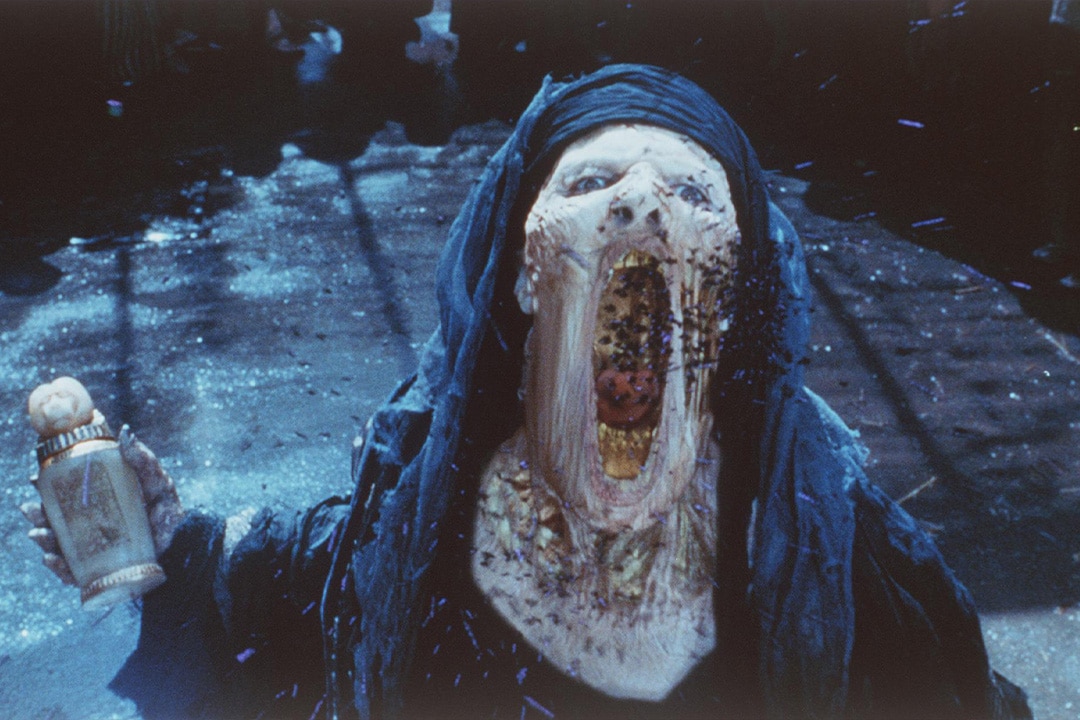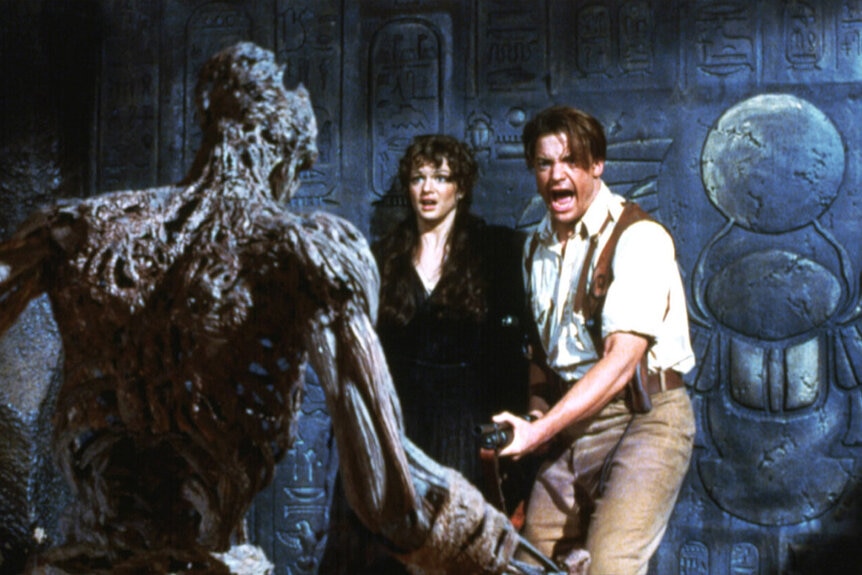Create a free profile to get unlimited access to exclusive videos, sweepstakes, and more!
'The Mummy' director Stephen Sommers recalls tumultuous, decade-long development process
It's not easy to resurrect a bandaged corpse buried beneath the sands of Ancient Egypt.

The process of resurrecting a bandaged corpse buried beneath shifting the sands of Ancient Egypt isn't as easy as one might think.
Recently hopping on a phone call with SYFY WIRE for a wider look back at his criminally underrated monster mash, 2004's Van Helsing (now streaming on Peacock), writer/director Stephen Sommers reflected on how he first became associated with the Universal Pictures catalogue of silver screen creatures by way of 1999's The Mummy. A blockbuster remake of the 1932 movie of the same name, the project had gestated at the studio for close to a decade before Sommers (known at the time for The Jungle Book and Deep Rising) came aboard.
"There had been half a dozen different writers and directors on it," he told us. "In fact, the guy before me was John Sayles and he was gonna write it and direct it. His script was actually good, but it all took place in Los Angeles because for nine years, they were basically trying to do a remake of the Boris Karloff Mummy. Which is ridiculous. I love the Boris Karloff [version], but I had no interest in remaking that movie."
Sommers also learned of a budgetary struggle between the studio and producers in those early stages. Universal wanted to limit the funds to $12 million, while the producers hoped to increase that figure to $15 million.
"I go, ‘Hell, I’ll need $15 million just for the visual effects,'" Sommers recalled. "When I told the studio my vision of it, they went, ‘Well, yeah, if you’re gonna do a remake of the Boris Karloff Mummy, a low-budget horror movie with a guy wrapped in bandages, you’re not gonna spend that much money. But if you’re gonna do something [bigger, we’ll give you more money].’"
In the end, The Mummy was made for a sizable $80 million, though Universal wasn't complaining about the price tag once the film opened theatrically in early May of 1999. An effortlessly entertaining, Indiana Jones-style throwback to the swashbuckling adventure serials of the 1930s and '40s, the summer tentpole went on to make over $400 million worldwide, spawning a lucrative franchise of sequels, merchandise, a television spinoff, and a long-running theme park ride.
A game cast made up of Brendan Fraser, Rachel Weisz, John Hannah, Arnold Vosloo, Oded Fehr, Kevin J. O'Connor, and Jonathan Hyde went a long way in selling the effects-heavy action. Sommers, however, credits the overall success to the movie's titular antagonist, a high priest by the name of Imhotep (Vosloo) hoping to revive his one true love, Anck-su-namun (Patricia Velásquez).
RELATED: Brendan Fraser says doing another 'Mummy' movie would be 'fun' if 'right conceit'
"I remember at the premiere of The Mummy, my mom leaned over as the credits were rolling and goes, ‘I hope you don’t mind, I kind of felt sorry for the Mummy.’ And it worked because yeah, he needs to go," he said. "Somebody’s gotta kill this guy because he’s on a rampage, but he does it all for love. He just wants to bring the love of his life back. It works with people that way."
Sommers continued: "When we previewed the movie, a couple of studio executives were like, ‘People aren’t cheering when Brendan kills the Mummy! Maybe the fight needs to be longer.’ I go, ‘No, guys, they’re never gonna cheer. They’re happy that Brendan saved Rachel and all three of them work together to kill the Mummy and they’re glad the Mummy’s dead. But at the same time, they kind of understand [his motivations]. I guess it gives it dimensions. They’re not just pure evil. Most good actors would not want to do something that’s one-dimensional pure evil. You want to figure out how people can relate to them a little bit, even if they’re serial killers."
While the 1999 remake is now considered to be just as much of a Hollywood classic as the 1932 original, the writer/director wasn't entirely sure the piece would work as he entered post-production.
"I remember we were terrified," he admitted. "In the editing room, we had Gary Larson cartoons ... about how you can unwrap the Mummy [and] outrun him. People didn't understand why he was scary. People had been making fun of The Mummy for 30-40 years. And I was like, ‘Oh, crap! What have I done?!’ But I thought, ‘Well, the way I’m approaching it, I think people will get into it.’"
RELATED: Why we’re glad ‘The Mummy’ didn’t kill off Jonathan Carnahan, the true heart of the franchise
Thankfully, everything worked out and, in true Tinseltown fashion, a sequel had to be made. Produced for $98 million, The Mummy Returns opened on the big screen two years later in May 2001, and made even more money than its predecessor. What you may not know is that Sommers initially had no clue how to continue the story of the O'Connell family when Universal asked him to crank out a second chapter. "I had no idea," he said. "But then I sat down and went, ‘Where should this go?’"
With that said, the filmmaker always knew he wanted to bring back the character of Ardeth Bay (Fehr) if a sequel was in the cards, and rewrote the ending of the first movie to keep him alive: "I call up [Universal Pictures Chairman Stacey Snider] and said, ‘The character of Ardeth Bay, that actor is so nice. Do you mind if I don’t kill him off and bring him back at the end of the movie?’ In hindsight, I’m sure she had no idea which actor I was talking about and was like, ‘Yeah, sure.’ So that’s why he comes back at the end and grabs John Hannah. There’s a [jump] scare there and he rides off and I got to bring him back for the sequel."
The animated series inspired by The Mummy that ran on Kids' WB between 2001 and 2003 is currently streaming on Peacock. All three Mummy movies are now available from Universal Pictures.



























